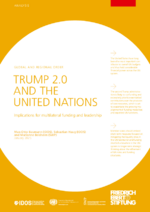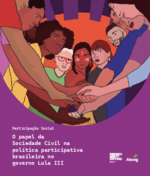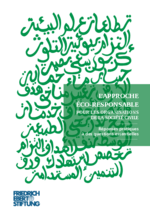International Community and Civil Society
Changing the World Together
We are fighting for international solidarity and democratic participation in global politics. Civil society needs to have a say when it comes to solving problems and making rules that apply to all of us. The common good, and not the interests of the economically powerful, should be front and center – also on the global stage. International organizations that take the wellbeing of all human beings into account can play a vital role in the reduction of global inequality and the implementation the United Nation's 2030 Agenda for Sustainable Development – with shared politics, responsibilities and cooperation.
In the global political order that we and our partners advocate for all over the world, states work together as equal partners in finding consensus-oriented solutions. The goal is a multilateral system in which all countries strive for a long-term, structural and social transformation – just like it was laid down in the 2030 Agenda.
Such a mission is beyond the scope of single states' development efforts: Changing the world is a global task.
News About International Community and Civil Society
More articles are available here.
Publications
Baumann, Max-Otto; Haug, Sebastian; Beisheim, Marianne
Trump 2.0 and the United Nations
Bonn, 2025
Download (PDF) (250 KB, PDF-File)
O papel da sociedade civil na política participativa brasileira no governo Lula III
SãoPaulo, 2024
Download (PDF) (4,3 MB PDF-File)
Renforcer la réforme du secteur de la sécurité en amplifiant la collaboration entre l'etat et les acteurs de la société civile
Download (PDF) (1,7 MB PDF-File)
Mechieche, Zineb
L'approche éco-responsable pour les organisations de la société civile
Algier, 2024
Download (PDF) (1 MB, PDF-Fle)
Mechieche, Zineb
[L'approche éco-responsable pour les organisations de la société civile]
Algier, 2024
Download (PDF) (1,5 MB PDF-Fle)
International Community, Civil Society and Progressive Politics
More and more actors are turning away from supporting international organizations and multilateralism as a whole. Why do we need to act multilaterally anyway? Because our world is shaped by networks, by shared risks and mutual dependency. Because rule-bound decisions on a global stage, on the basis of equal cooperation between states, is an achievement. Because global problems require coordinated efforts.
In times of multiple global crises we need a new form of international cooperation. That's why we advocate for international solidarity and democratic participation in global politics. The role of civil society in solving problems that affect all of society should not be an abstract ideal. It ensures that the common good – and not just the interests of powerful economic players – takes precedence on the global stage. Also, involving civil society actors at every step strengthens transparency and accountability at global forums.
We are committed to ensuring that multilateral organizations play a key role in reducing inequality – through international cooperation, global policies and multilateral commitments. Last but not least, states need to support each other and work together to reach the Sustainable Development Goals set down in the 2030 Agenda. For these Goals are at the core of our vision for a global world order.
When we look at “development”, we don't just regard this to be an issue of the “Global South”, “poor countries” or “developing states”. On the contrary, we are envisioning a global political order in which states work together as equal partners in finding consensus-oriented solutions. The ultimate goal is a multilateral system in which all countries strive for a long-term, structural and social transformation as defined in the 2030 Agenda. Such an ambitious endeavor cannot be carried out by the development efforts of single states alone. “Development” is a global mission in which non-state actors play a central role.
For more Solidarity in Institutions and a Strong Civil Society: Our Approach
We enable representatives of the Global South – such as trade unions, civil society organizations, networks and social movements – to take part in international debates, for instance at the United Nations, Bretton Woods Institutions and other relevant global forums. We also raise awareness for alternative solutions outside of formal institutions at the World Social Forum. And we take part in official consultations and so-called “side events” as well.
Our partner initiatives and networks review the implementation of international agreements like the 2030 Agenda and remind rich states of their obligations. In this way, we can play a part in making international policy more just. Our partners also make valuable contributions to global politics by continuously drawing attention to human rights, the environment and development and by questioning the global economic system.
The Friedrich-Ebert-Stiftung's entire international work is based on the 2030 Agenda's 17 Global Sustainable Development Goals. Every year, the "Spotlight Report" published by the Civil Society Reflection Group points out – yet again – that the problem lies not in acknowledging the goals, but rather in implementing them. So far, most states are struggling to transfer the 2030 Agenda's transformative ideas into their national policies. The report shines a particular spotlight on Financing for Development.
In order to not only increase the sum of Financing for Development (FfD), but to also make it more effective in fighting against poverty, the international finance system needs to be improved. To further this goal, ever since 2008 the FES office in New York has been organizing a forum in which government officials, multilateral organizations, civil society and the private sector can exchange ideas. Simultaneously, we support the strategy meetings run by the civil society platform CSOs for FfD, an organization that has been a vocal part of discussions on FfD ever since the Doha Round. The FES is also partnering with many of the platform members in their project countries. In addition, the FES office in Geneva – together with the United Nations Conference on Trade and Development (UNCTAD) – has been organizing the FfD Forum. This Forum is a meeting of an intergovernmental group of experts, but the FES invited civil society experts as well.




![[L'approche éco-responsable pour les organisations de la société civile]](https://www.fes.de/uploads/pics/digbibcache/publication_21684_150.jpg)